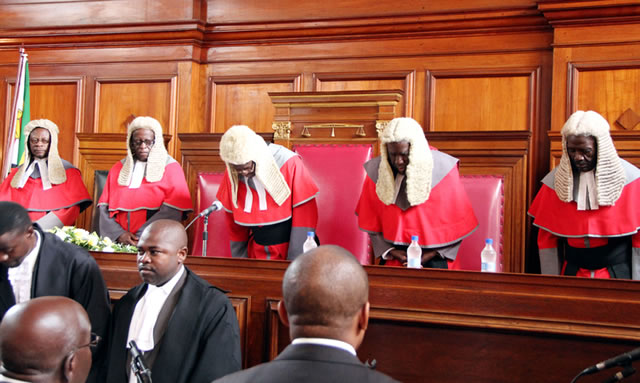Harare – Zimbabweans have been asked to help decide whether judges should stop the colonial tradition of wearing wigs and to suggest alternative headgear in a public consultation that ends on Thursday.
The horsehair blonde wigs worn by judges at Zimbabwe’s superior courts have been at the centre of a public debate.
Some see them as a token of respect that brings solemnity to the courtroom, but others argue they are an unnecessary relic of British rule.
Zimbabwe asks for public view on judges’ wigshttps://t.co/ojlWxKxEcZ @ecr9495 pic.twitter.com/774dtMs2pc
— ECR_Newswatch (@ECR_Newswatch) November 3, 2022
In September, Zimbabwe’s Judicial Service Commission (JSC), a public body that oversees the work of judges, appointed a committee to settle the issue and last month asked for people’s views via an online feedback form.
Among other questions, respondents have been asked whether they regard “judicial wigs as critical to the administration of justice” and what effect the hairpieces have on them when they appear in court.
These wishing to do away with the wigs, have also been asked to suggest alternative headgear that they would like judicial officers to wear.
“The authority of a judicial officer does not derive from the manner in which they dress but from the constitution,” veteran lawyer Alec Muchadehama told AFP.
“Whether or not you’re wearing a wig is not relevant. This is just an old tradition we adopted from colonial times.”
ALSO READ | Zimbabwe ruling party endorses president for 2023 vote
Zimbabwe still imports judicial wigs from Britain and the public expenditure to procure them has caused outrage in the past.
The JSC angered lawyers groups in 2019 when placing an order for 64 wigs at a cost of more than 110 000 pounds ($ 126 000).
“This practice must be dropped to save money that could be allocated for other necessary costs such as subsidising user fees,” Zimbabwe Lawyers for Human Rights, a non-profit group, said in a statement describing wigs’ use as “outdated”.
Follow African Insider on Facebook, Twitter and Instagram
Source: AFP
Picture: Twitter/@hallaboutafrica
For more African news, visit Africaninsider.com


